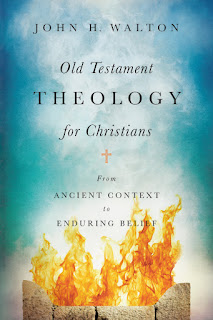"Old Testament Theology for Christians" by John H. Walton. A Review
Old Testament Theology for Christians: From Ancient Context to Enduring
Belief
John H. Walton
InterVarsity Press (IVP
Academic)
PO Box 1400
Downers Grove, IL 60515
PO Box 1400
Downers Grove, IL 60515
Ivpress.com
ISBN: 978-0-8308-5192-8; November 2017; $27.00
To help Christians
read, and grasp, what the Old Testament says and doesn’t say, John H. Walton, professor
of Old Testament at Wheaton College and Graduate School, has compiled a new 320
page hardback. “Old Testament Theology for Christians: From Ancient Context to
Enduring Belief” is, overall, an easy
volume to peruse, because it is written for those who have little or no specialized
background in Old Testament studies. If a reader is unfamiliar with Walton’s
program in his “Lost World” series, this is a great entry point. Most of Walton’s
central ideas are mapped out and visited in these pages.
Outside of the introduction and conclusion,
the work covers six Old Testament foci: Yahweh and the Gods, Cosmos and
Humanity, Covenant and Kingdom, Temple and Torah, Sin and Evil. Each chapter
methodically works through its subjects from the Hebrew Scriptures. Though
Walton gives extra time and energy to how the Ancient Near Eastern (ANE) world
addressed each of these subjects, he pays very little attention to the way in
which the New Testament writers read and employed these earlier sacred
writings. As the author asserts: “we should be willing to look at Old Testament
theology independent of New Testament theology” (20).
What the author sees as the primary theme that
progresses throughout the Old Testament, “is the establishment of God’s
presence among his people” (26). Though he doesn’t see it as the center of the
Hebrew writings, he does note how it dominates and diffuses across covenant,
promise, Torah, and kingdom. Walton will happily circle back to this major
theme throughout the document. Coupled with this primary theme, he will capitalize
on the distinct difference between the ANE world’s view of the gods and Israel’s
approach to YHWH. The ANE world saw the relationship between people and gods as
the “Great Symbiosis” where “the people took care of the gods,” whereas YHWH’s
relationship with his people is the “Great Enterprise” in which God protects
and provides for Israel and gives them a role in his plans and purposes (112).
Walton’s unpacking of this primary theme, and the difference between the “Great
Symbiosis” and the “Great Enterprise” is his most helpful contribution to
reading the Old Testament.
Walton’s approach in “Old Testament Theology
for Christians” is to attend “to the historical place and setting of the Old Testament
literature, but I will not be stopping at historical inquiry. I will instead
seek to use historical inquiry to uncover the enduring theological revelation
that remains God’s Word to the church today” (25). It becomes clear, as one
advances through the book, that the emphasis is on what “remains God’s Word to
the Church today” after the author has peeled away much that has historically
been thought to be affirmed in the Old Testament. Since the author reads and
hears the Hebrew Scriptures through the filter of ANE’s cultural stream, he can’t
lean on the text as factual or historical, but he can only glean from the text
what he presumes is revealed about God’s mission: “The message transcends culture,
but it is given in a form that is fully ensconced in the ancient cultural river
of Israel” (76). Therefore, for the author, the Old Testament has nothing to
say about the Trinity, does not mention a reward or judgment in the afterlife, has
no concept of original guilt passed on from Adam to the rest of humankind, presents
no developed notions of Satan, has no mechanism for salvation from sin, does
not recognize the indwelling Spirit, and does not prescribe evangelism
(286-293).
“Old Testament Theology for Christians” was
a hard book for me to swallow, not because of any technicality, but because of
the author’s working premises. I’ve noted above what I found valuable, and some
of what I found problematic. If you need to delve into Walton’s “Lost World”
project, this volume would be a good starting place to familiarize yourself
with what he’s up to and why. If you’re looking for a good book to help you
read and understand the Old Testament, I would recommend you go elsewhere.
Thanks to IVP Academic for providing, upon
my request, the free copy of the book used for this review. The assessments are
mine given without restrictions or requirements (as per Federal Trade
Commission’s 16 CFR, Part 255).




Comments